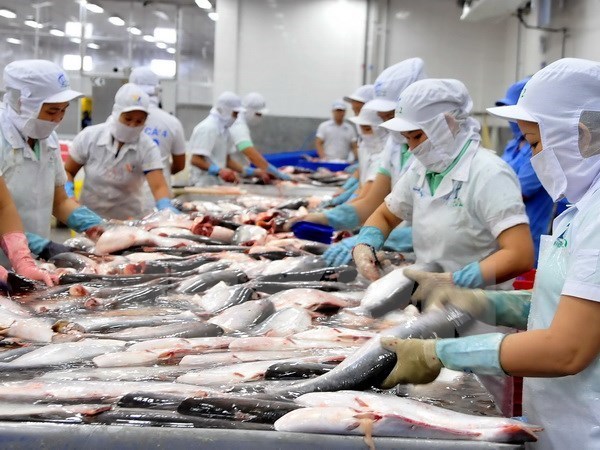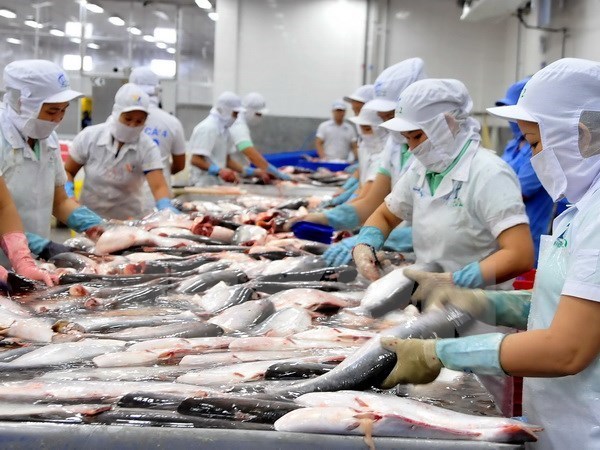
More Vietnamese businesses may soon be allowed to export aquatic products to Russia this year after a Russian working group made a fact-finding tour of some Vietnamese exporters, said Trade Counsellor of Vietnam in Russia Duong Hoang Minh.

A tra fish
processing factory (Photo: VNA)
Minh said Vietnam’s trade office in Russia had earlier held a
working session with local agencies.
The move was made after Vietnam was given a "yellow card” warning by the
European Commission in September 2017 for failing to progress in fighting
illegal fishing, which could lead to a drop in aquatic exports to the EU and
other markets.
The counsellor said exports to Russia have encountered difficulties recently
since this country and the Eurasian Economic Union (EAEU), of which it is a
member, limited aquatic product imports and only allowed 21 Vietnamese
companies to ship products to Russia.
However, there are more than 500 Vietnamese businesses eligible to export to
the EU and other demanding markets at present. Therefore, the trade office of
Vietnam has worked with the Ministry of Agriculture and Rural Development to
persuade Russian agencies to lift barriers to Vietnamese aquatic products.
It also invited relevant agencies of Russia and the EAEU to make fact-finding
tours to Vietnam in an effort to have more companies be allowed ship aquatic
products to these markets, Minh added.
In 2017, Vietnam exported 2.2 billion USD worth of goods to Russia, up 35
percent year on year. Commodities with high export growth included vegetables,
fruits, cashew nuts, textiles-garments, wood products, machinery and spare
parts.
The counsellor said the Vietnamese trade office in Russia will now focus on
helping businesses boost shipments and capitalise on the Vietnam-EAEU Free
Trade Agreement.
It will also continue working to understand regulations and commitments in the
World Trade Organisation and free trade agreements, as well as possible trade
barriers.
Source: VNA
According to data from the Hoa Binh Provincial Party Committee, the industrial production index for the first six months of 2025 is estimated to have increased by 20% compared to the same period last year. This marks the highest year-on-year growth rate for this period since 2020.
In the first six months of 2025, Hoa Binh province’s export turnover was estimated at 1.145 billion USD, marking an 18.11% increase compared to the same period in 2024. Import turnover was estimated at $ 804 million, a 17.15% increase, which helped the province maintain a positive trade balance.
The lives of the ethnic minority farmers in Tan Lac district have gradually improved thanks to the new directions in agricultural production. This is a testament to the collective strength fostered through the professional associations and groups implemented by various levels of the district’s Farmers’ Union.
With the motto the "product quality comes first,” after nearly one year of establishment and operation, Muong village’s Clean Food Agricultural and Commercial Cooperative, located in Cau Hamlet, Hung Son Commune (Kim Boi district), has launched reputable, high-quality agricultural products to the market that are well-received by consumers. The products such as Muong village’s pork sausage, salt-cured chicken, and salt-cured pork hocks have gradually carved out a place in the market and they are on the path to obtaining the OCOP certification.
In the past, the phrase "bumper harvest, rock-bottom prices" was a familiar refrain for Vietnamese farmers engaged in fragmented, small-scale agriculture. But today, a new spirit is emerging across rural areas of Hoa Binh province - one of collaboration, organisation, and collective economic models that provide a stable foundation for production.
Maintaining growing area codes and packing facility codes in accordance with regulations is a mandatory requirement for agricultural products to be eligible for export. Recently, the Department of Agriculture and Environment of Hoa Binh province has intensified technical supervision of designated farming areas and packing facilities to safeguard the "green passport" that enables its products to access international markets.



